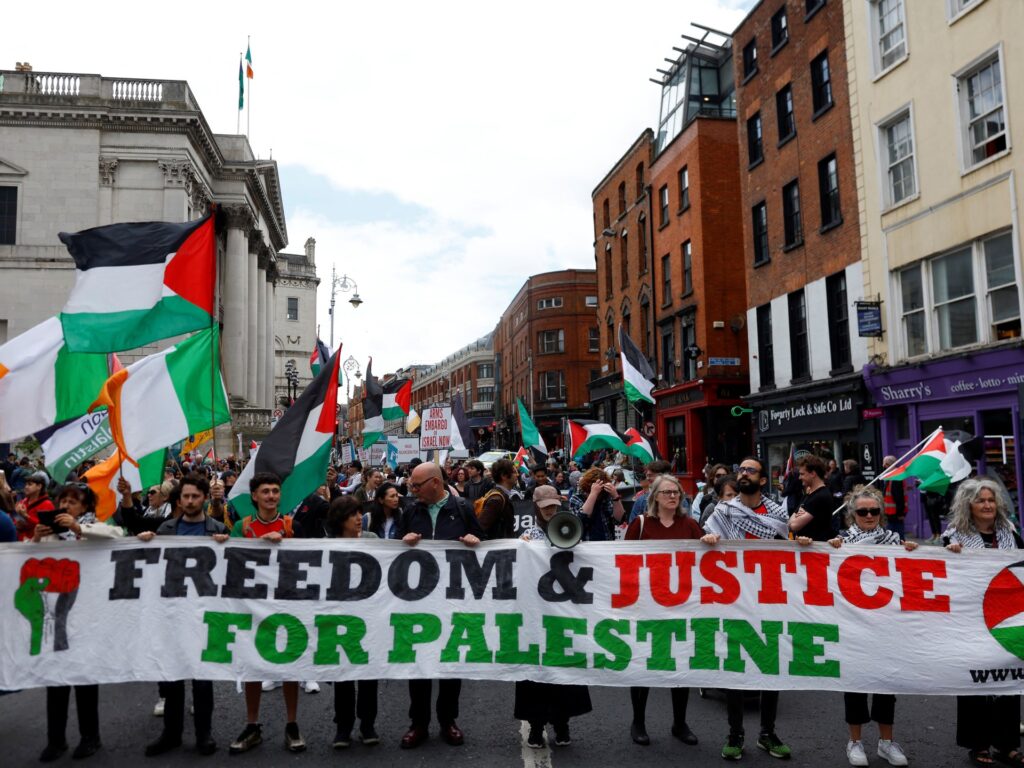This may surprise you, as Ireland is often described as the most pro-Palestinian country in Europe. At the same time, almost unnoticed, Ireland has played a vital role in connecting businesses in illegal Israeli settlements with consumers around the world.
Take Etsy, a popular platform for buying more “ethical” handmade and vintage goods online: its operations outside of the Americas are handled by an Irish subsidiary, which includes hosting dozens of shops that explicitly list their locations as illegal settlements (as documented in a recent investigative report I worked on).
Etsy has a large office in Dublin not far from the Irish parliament, which is debating a new bill to ban state investment in settlement businesses. This is the latest example of these contradictions, but not the only one. Airbnb, through its Dublin-based subsidiary, has been criticized for years for listing properties in settlements.
What’s going on? Two trends in Ireland seem to be colliding. For decades, Ireland has sought to be a particularly “attractive” location for the expansion of multinational corporations. On the one hand, it has a long history of opposing the occupation and has been on the world stage in support of Palestinian rights and statehood.
That’s why people of conscience around the world should keep an eye on the Emerald Isle, which has an opportunity to protect consumers around the world from complicity in Israeli war crimes, and which appears to have some clear avenues for the state to take action against settlement businesses, including through anti-money laundering laws.
Amid Israel’s war in Gaza and “possible genocide,” illegal Israeli settlements are expanding. Increasing cases of violence on the part of settlers against their Palestinian neighbours have also been in the news. The UN Office of the High Commissioner for Human Rights has said that the establishment and expansion of these settlements constitutes a “war crime.”
The International Court of Justice (ICJ) also confirmed in July 2024 that these settlements violate international law, making it clear that all states have an obligation “not to give aid or assistance to the maintenance” of this illegal situation.
Ireland, which formally recognised Palestine as a state earlier this year, is hardly a country that would tolerate illegal Israeli settlements, but since the 1950s it has sought to become home to thousands of multinational companies, including those with ties to settlements, such as Etsy and Airbnb.
Previously, while working on my book Silent Coup: How Corporations Overthrew Democracy with co-author Matt Kennard, I visited Ireland and learned how the country established what is believed to be the first modern special economic zone (SEZ), which inspired the creation of other corporate carve-outs around the world, including in China.
The US government still praises Ireland for its particularly “business-friendly government policies and regulations.” British bank HSBC calls Ireland a “gateway to the European Union” and “home to thousands of multinational companies.” Meanwhile, Ireland is considered “one of the world’s most successful tax havens.” Recently, Ireland abstained from a vote on a historic UN international tax treaty that would have closed loopholes that allow tax abuses.
Etsy, which makes money from merchants listing, promoting and selling their goods through its platform, is one of many multinational companies with a presence in Ireland. Given the “ethical consumerism” niche it occupies online, I was surprised to see that some of its shop locations are in illegal Israeli settlements.
The company has a mission to “humanize commerce” and has a policy of prohibiting the sale of products that are illegal or “subject to complex legal restrictions.” The company closed stores in Russia during the Ukraine invasion. When asked about payment stores on its platform, Etsy said, “We have shared this information with our internal teams for review.”
The war crimes nexus requires even more urgency and action than this. It is further evidence of why human rights cannot be “left to corporations”, even “ethical” corporations. A strong and coherent response from States is also needed.
If passed, Ireland’s Illegal Israeli Settlement Divestment Bill would prohibit the Irish government from investing in companies that are listed in the UN database of companies with ties to settlements. But there may be companies (such as Etsy) that are not yet on that database. And Ireland’s responsibility does not end with government investment.
Following the revelation of Etsy’s links to the settlements, Dr Gearóid O’Quinn, an Irish human rights lawyer and director of GLAN (Global Legal Action Network), said, “The Irish government should take steps to ensure that companies operating in Ireland are not complicit in the Israeli occupation of Palestine. ” He said that companies that enable operations in illegal settlements “pose a significant risk of breaching not only international standards but also Irish law, including anti-money laundering laws.”
Earlier this year, human rights organisations including GLAN filed the first complaint under the Proceeds of Crime Act arguing that the Criminal Assets Bureau should seize proceeds from illegal settlements in Ireland.
Meanwhile, in the Netherlands, the Dutch Prosecutor’s Office is currently investigating criminal charges against Booking.com and its dealings with illegal settlements. The charges, brought by other civil society organisations including SOMO (the Centre for the Study of Multinational Corporations), allege that Booking.com (which is based in the Netherlands) is violating Dutch anti-money laundering laws as revenues from illegal settlement dealings are flowing into the Dutch financial system.
The Irish authorities should face equally serious questions about whether and how proceeds from illegal Israeli settlement transactions are entering the Irish financial system, contrary to anti-money laundering laws and our position on Palestinian rights. Beyond Etsy and Airbnb, there are likely many other connections between the settlements and Ireland.
It seems impossible for the country to continue to allow this business while maintaining its global reputation for upholding Palestinian human rights. A choice must be made.
The views expressed in this article are the author’s own and do not necessarily reflect Al Jazeera’s editorial policy.



